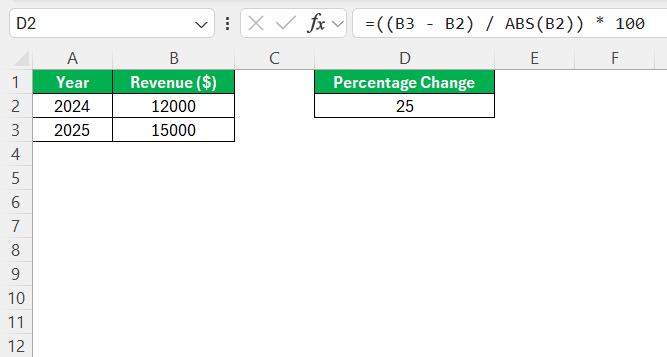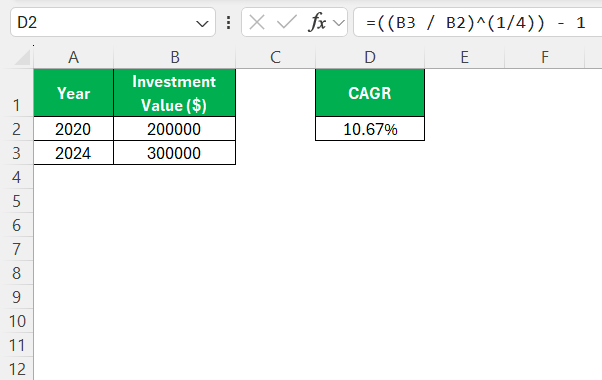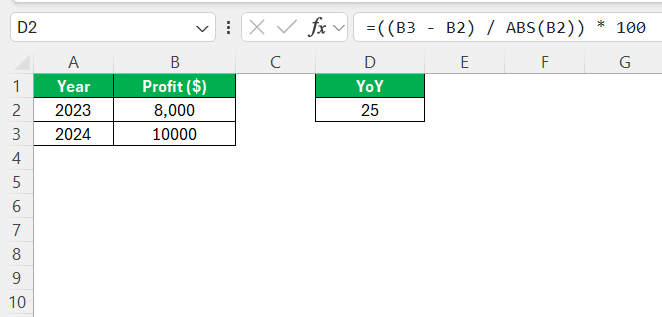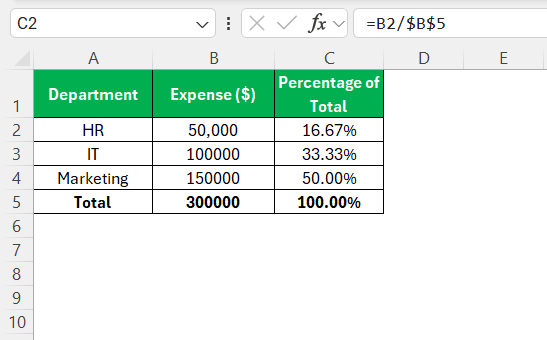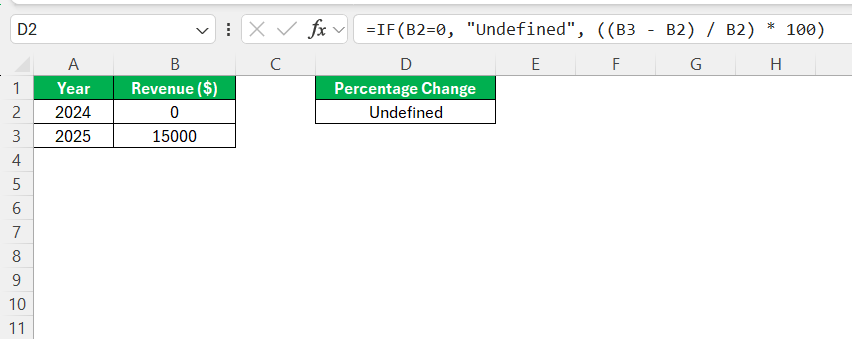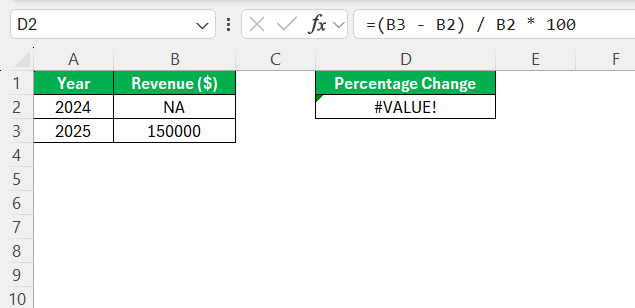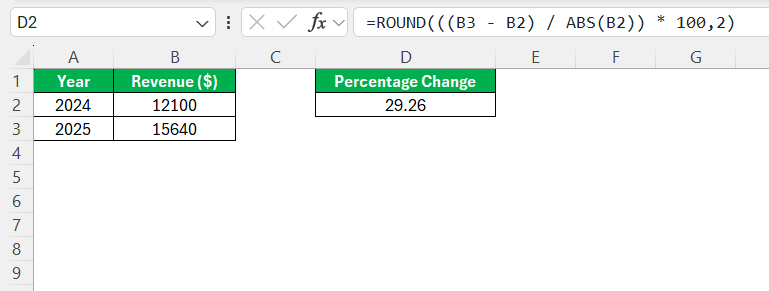Calculating percentage growth in Excel is an essential skill, especially for those involved in business analytics, financial modeling, and data management. Mastery of the right formulas can transform raw data into valuable insights, allowing us to identify trends, suggest improvements, and make informed decisions. In this guide, I’ll explore various formulas that facilitate accurate percentage growth calculations, coupled with practical examples and advanced techniques.
Key Takeaways:
- Use
=((New - Old) / ABS(Old)) * 100to calculate basic percentage growth. - Apply the CAGR formula to assess long-term growth trends.
- Year-over-year growth gives insights into annual performance.
- Format cells properly to avoid misinterpretations in results.
- Excel shortcuts and tricks dramatically improve productivity.
Table of Contents
Mastering Percentage Growth in Excel
Key Formulas for Accurate Calculations
When calculating percentage growth in Excel, several key formulas serve as the foundation for accuracy. Here are the indispensable formulas you should become familiar with:
Basic Percentage Change Formula:
Formula: =((New Value - Old Value) / ABS(Old Value)) * 100
This formula calculates the percent change from an original value to a new one, offering a clear percentage increase or decrease.
Compound Annual Growth Rate (CAGR):
Formula: =((End Value / Start Value)^(1/Number of Periods)) - 1
Use CAGR to find the average annual growth rate over a specified period, perfect for evaluating long-term investment growth.
Year-over-Year Growth Rate:
Formula: =((Value This Year - Value Last Year) / ABS(Value Last Year)) * 100
This formula measures growth compared to the previous year, useful for annual financial performance reviews.
Percentage of Total:
Formula: (Part/Total)
Apply this to find what percentage a particular value is of the whole, essential for assessing distribution efficiency.
Mastering these formulas will empower us to perform accurate percentage growth calculations, regardless of the complexity of the data. Each formula serves a specific purpose, and knowing when and how to apply them is key to effective analysis.
Practical Examples of Percentage Growth Calculations
Percentage growth calculations play a pivotal role in financial modeling, where they’re extensively used to forecast and analyze business performance. Here are some practical applications:
- Revenue Forecasting: By calculating past revenue growth rates, we can predict future income streams. This helps in budgeting and strategic planning, allowing us to set realistic financial goals.
- Investment Analysis: Evaluate the performance of portfolios by assessing the percentage growth of investments over time. This insight aids in identifying the most profitable assets and adjusting strategies accordingly.
- Cost Analysis: Determine changes in expenses year-over-year. Knowing how costs evolve helps manage budgets effectively and find areas where cost-cutting measures might be necessary.
- Profit Margin Evaluations: Calculate the percentage change in profit margins to assess operational efficiency. By comparing these changes over periods, we can make informed decisions about pricing, cost management, and product lines.
- Market Share Analysis: Measure a company’s growth in terms of market share. Understanding how market position changes over time can guide competitive strategies and marketing efforts.
These applications demonstrate the indispensability of percentage growth in financial modeling. They offer a quantitative basis for decision-making, helping us navigate financial opportunities and risks with greater precision.
Troubleshooting Common Calculation Errors
Encountering calculation errors in Excel can be frustrating, especially when they disrupt our percentage growth analyses. Here are some common errors and effective troubleshooting methods I follow to resolve them:
- #DIV/0! Error: This occurs when a formula attempts to divide by zero. To fix this, ensure the original value is never zero. Use the
IFfunction to check for zero before dividing, such as: =IF(A1=0, “Undefined”, ((B1 – A1) / A1) * 100)
- #VALUE! Error: Typically arises from incorrect data types, like trying to calculate with text instead of numbers. Verify all involved cell data types are numerical.
- Inconsistent Formatting: This can result in misinterpretations of percentage results. Ensure cells are formatted consistently as percentages and review any variations in data formatting, like currency symbols or decimal points, which might impact calculations.
- Incorrect Cell References: Typos or errors in cell references can derail calculations. Double-check that formulas reference the correct cells. Use Excel’s
Trace PrecedentsandTrace Dependentstools to visually map and verify cell relationships and dependencies in your calculations. - Rounding Errors: Slight differences due to rounding can affect result precision, especially in financial analyses. Utilize Excel’s
ROUNDfunction to maintain consistency, particularly in calculations involving multiple decimal places.
By proactively troubleshooting these common errors, we can maintain the accuracy and integrity of our percentage growth calculations. These strategies not only help in resolving issues promptly but also enhance our ability to deliver reliable data insights.
Boosting Productivity with Excel Tips
Keyboard Shortcuts for Faster Operations
Keyboard shortcuts in Excel can significantly expedite our workflow, enhancing efficiency in everyday tasks including percentage growth calculations. Here are some essential shortcuts I find invaluable:
Basic Navigation:
Ctrl + Arrow Keys: Jump to the edge of data regions quickly, saving time when navigating large datasets.Ctrl + Home/End: Quickly reach the beginning or end of a worksheet, ideal for setting up or reviewing data.
Formatting:
Ctrl + Shift + %: Quickly format cells to display values as percentages, essential for handling growth calculations.Ctrl + 1: Open the Format Cells dialog box to adjust formatting options easily.
Formulas and Functions:
Alt + =: Automatically insert the SUM function to sum adjacent data, a useful time-saver for cumulative percentage calculations.Ctrl + Shift + Enter: Enter an array formula, perfect for complex calculations over data ranges.
Data Management:
Ctrl + Shift + L: Apply/remove filters to your dataset, which can help in isolating and analyzing specific growth data.F4: Repeat last action, like applying the same formula to multiple cells without retyping.
Incorporating these keyboard shortcuts into ourdaily routine allows us to perform tasks more quickly and efficiently, minimizing time spent on mundane operations and maximizing our productivity in Excel data analysis. This enables us to focus more on interpreting data and less on navigation and formatting tasks.
Speed Up Your Process with Expert Tricks
Enhancing our Excel efficiency can be achieved through several expert tricks beyond basic shortcuts, enabling us to conduct percentage growth calculations and other tasks more swiftly. Here are some techniques I often employ:
- Utilize Named Ranges: Assign names to key data ranges with
Ctrl + F3, making it easier to reference them in formulas. This simplifies complex calculations and ensures accuracy by reducing the chance of referencing incorrect cells.
- Quick Fill Handle: Drag the fill handle (bottom right of a cell) to instantly copy formulas or extend data series. This trick speeds up the process of applying the same percentage calculation across a column or row.
- Data Validation Lists: Create drop-down lists using data validation to control inputs and minimize errors. This is particularly useful for ensuring consistent data entry in fields where specific numerical inputs or categories are required.
- Use Pivot Table Features: With
ALT + D + P, quickly generate pivot tables to dynamically summarize data. Pivot tables can effectively analyze percentage growth trends by enabling users to slice and dice data through various dimensions.
- Leverage Excel’s Flash Fill: Automatically fill a column based on examples provided, perfect for quickly formatting or extracting parts of data strings without using complicated formulas.
By incorporating these expert techniques, we enhance our productivity in Excel, allowing us to manage and analyze data with greater speed and precision. These strategies not only streamline the workflow but also elevate the overall efficiency of our data handling and interpretation tasks.
FAQs
What is the most efficient way to calculate percentage change in Excel?
The most efficient way to calculate percentage change in Excel is to use the formula: =((New Value - Original Value) / ABS(Original Value)) * 100, and format the result as a percentage. This method provides accurate and clear results. Use cell references for New Value and Original Value to automate calculations across multiple data points.
How do I handle percentage growth with negative numbers?
To handle percentage growth with negative numbers, use the formula =((New Value - Original Value) / ABS(Original Value)) * 100. This ensures the percentage reflects the true magnitude of change, whether it indicates growth or reduction in losses, by using absolute values to avoid division errors.
What are common errors to avoid in Excel formulas?
Common errors to avoid in Excel formulas include #DIV/0!, which occurs when dividing by zero; #VALUE!, due to incorrect data types; and incorrect cell references that can lead to wrong results. Ensure consistent data formatting, validate cell references, and use error-checking functions like IFERROR to manage potential mistakes.
When should I use CAGR instead of basic percentage change?
Use CAGR (=((End Value/Start Value)^(1/Periods))-1) when you’re analyzing growth over multiple time periods, such as years. Unlike simple percentage change, CAGR gives the smoothed average rate of return per year. It’s particularly useful for comparing investment options or evaluating long-term financial performance.
How can I prevent formatting issues in percentage calculations?
Always double-check cell formats—your results may look wrong if they’re not formatted as percentages. Go to Format Cells (Ctrl + 1), select “Percentage,” and choose appropriate decimal places. Also watch out for currency symbols or text in numeric cells, as these can cause #VALUE! errors.
John Michaloudis is a former accountant and finance analyst at General Electric, a Microsoft MVP since 2020, an Amazon #1 bestselling author of 4 Microsoft Excel books and teacher of Microsoft Excel & Office over at his flagship MyExcelOnline Academy Online Course.

